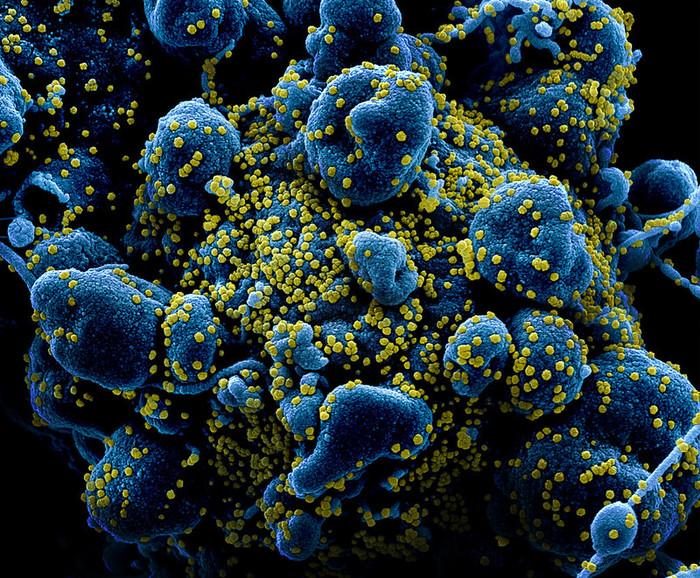NIH research finds higher risk and worse outcomes for those with addiction

Credit: NIAID
A National Institutes of Health-funded study found that people with substance use disorders (SUDs) are more susceptible to COVID-19 and its complications. The research, published today in Molecular Psychiatry, was co-authored by Nora D. Volkow, M.D., director of the National Institute on Drug Abuse (NIDA). The findings suggest that health care providers should closely monitor patients with SUDs and develop action plans to help shield them from infection and severe outcomes.
By analyzing the non-identifiable electronic health records (EHR) of millions of patients in the United States, the team of investigators revealed that while individuals with an SUD constituted 10.3% of the total study population, they represented 15.6% of the COVID-19 cases. The analysis revealed that those with a recent SUD diagnosis on record were more likely than those without to develop COVID-19, an effect that was strongest for opioid use disorder, followed by tobacco use disorder. Individuals with an SUD diagnosis were also more likely to experience worse COVID-19 outcomes (hospitalization, death), than people without an SUD.
“The lungs and cardiovascular system are often compromised in people with SUD, which may partially explain their heightened susceptibility to COVID-19,” said Dr. Volkow. “Another contributing factor is the marginalization of people with addiction, which makes it harder for them to access health care services. It is incumbent upon clinicians to meet the unique challenges of caring for this vulnerable population, just as they would any other high-risk group.”
NIDA’s Dr. Volkow and Rong Xu, Ph.D., of Case Western Reserve University in Cleveland, Ohio, analyzed EHR data collected until June 15, 2020, from 360 hospitals nationwide. The EHRs were de-identified to ensure privacy.
The study population consisted of over 73 million patients, of which over 7.5 million had been diagnosed with an SUD at some point in their lives. Slightly more than 12,000 were diagnosed with COVID-19, and about 1,880 had both an SUD and a COVID-19 diagnosis on record. The types of SUDs investigated in the study were tobacco, alcohol, opioid, cannabis, and cocaine.
The complicating effects of SUD were visible in increased adverse consequences of COVID-19. Hospitalizations and death rates of COVID-19 patients were all elevated in people with recorded SUDs compared to those without (41.0% versus 30.1% and 9.6% versus 6.6%, respectively).
Additionally, African Americans with a recent opioid use disorder diagnosis were over four times more likely to develop COVID-19, compared to whites. Results showed that hypertension, diabetes, cardiovascular diseases, and renal diseases, which are risk factors for COVID-19, were more prevalent among African Americans than whites with opioid use disorder.
According to the authors, the study findings underscore the need to screen for, and treat, SUDs as part of the strategy for controlling the pandemic. Additional research needs to be done to better understand how best to treat those with SUDs who are at risk for COVID-19 and counsel on how to avoid the risk of infection.
###
Article
Wang Q, Kaelber D, Xu R, Volkow ND. COVID-19 risk and outcomes in patients with substance use disorders: Analyses from electronic health records in the United States. Molecular Psychiatry. September 14, 2020.
*This research was funded by NIDA, the Eunice Kennedy Shriver National Institute of Child Health and Human Development and the National Institute on Aging, all parts of NIH, as well as the American Cancer Society and The Clinical and Translational Science Collaborative of Cleveland.
Media Contact
NIDA Press Office
[email protected]
Original Source
https:/
Related Journal Article
http://dx.




